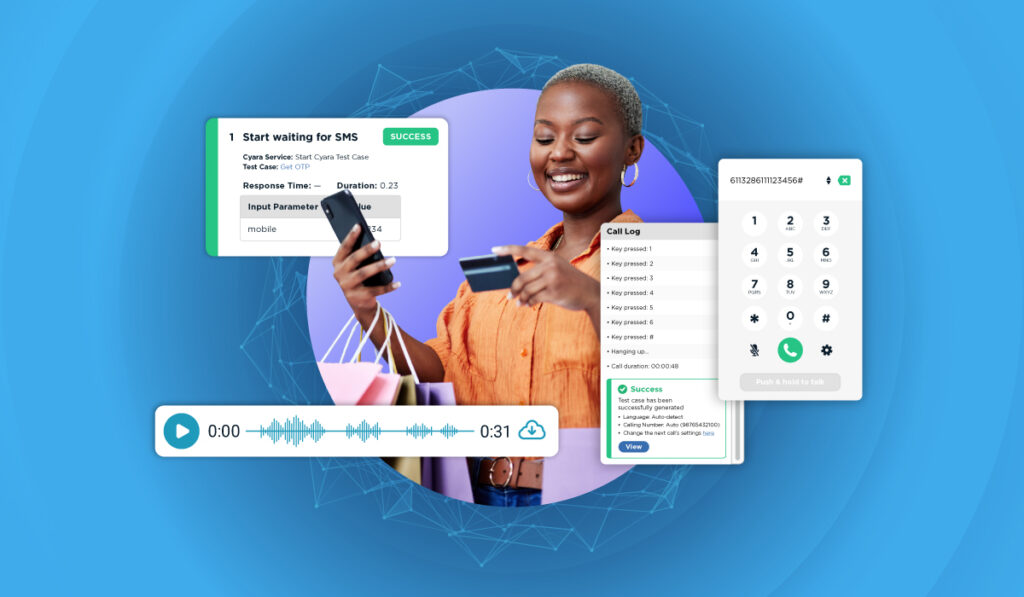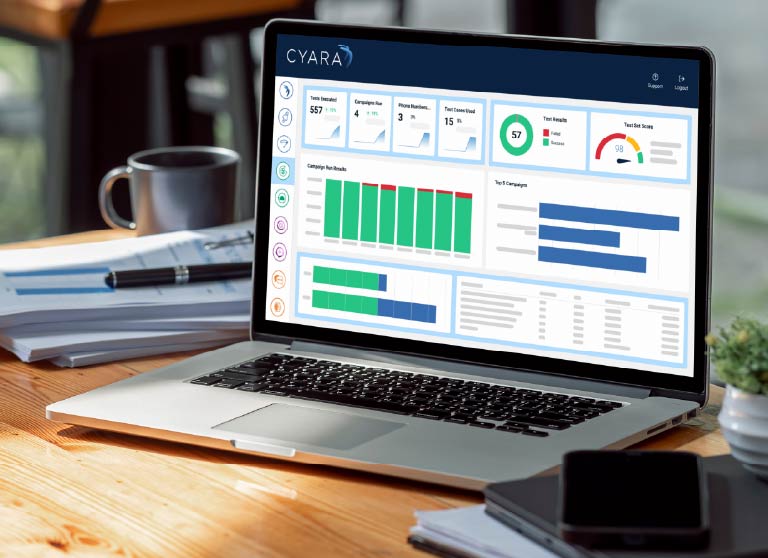When a customer calls your business, your interactive voice response (IVR) system often serves as the first touchpoint. Whether it’s guiding a caller to the right department, handling a balance inquiry, or enabling a password reset, your IVR makes the first impression. When your IVR is functioning as intended and meeting expectations, your customers will have an optimistic outlook and hold your brand in higher regard. But, it only takes a single defect to create issues and leave your customer with the impression that interacting with your business is burdensome and frustrating.
Improve your IVR performance and deliver high-quality customer interactions with Cyara.

With the rise of omnichannel environments, in which contact centers must seamlessly integrate interactions across all channels, the stakes of IVR performance have never been higher. Your customers are looking for streamlined, error-free, and consistent CX performance, and it only takes one minute of lag or downtime to drive your customers away, tarnish your reputation, and leave you vulnerable to compliance penalties.
This is where IVR testing comes in. An automated IVR testing solution ensures every interaction, from voice prompts to backend integrations, works as intended and delivers the frictionless experiences your customers expect. And, as modern IVRs evolve to include AI-powered technologies and support more complex customer queries, you can’t afford to take your testing for granted.
Why is IVR Testing Important?
IVR systems are more than just technical tools. They serve as critical touchpoints that directly influence customer satisfaction, brand loyalty, and the likelihood your customers will complete a journey to finalize a purchase. A well-functioning IVR streamlines service, reduces agent workloads, and provides self-service opportunities. But when your IVR fails, such as through a misrouted call, unrecognized prompts, or poor audio quality, it will drive operational costs up and erode customer trust.
And these risks only multiply in an omnichannel environment. Imagine a customer who starts with a chatbot, escalates to a phone call, and then needs follow-up through email. If the IVR system can’t retrieve context from the chatbot conversation or fails to hand off details to the agent, the customer is forced to repeat themselves. This not only wastes time but also undermines confidence in your organization.
Effective IVR testing validates the entire customer journey, ensuring IVR performance is consistent, resilient, and integrated with other channels. By identifying issues before they reach customers, you can safeguard brand loyalty, maintain operational efficiency, and avoid costly rework and compliance risks.
1. Use comprehensive, continuous tests
Too often, organizations focus on only surface-level IVR tests, such as checking whether menu prompts play correctly or digits are captured. While it’s necessary to test these components, it isn’t enough to only conduct one-off tests or only validate individual aspects of your infrastructure.
Errors can emerge sporadically throughout the development lifecycle, such as after updating your systems or during periods of high-volume traffic. Just because a test doesn’t identify an issue, doesn’t mean that an issue won’t appear further down the line, and you need to detect it as soon as possible by continuously testing your CX journeys, or risk exposing your customers to unoptimized IVRs.
Likewise, verifying IVR performance relies more on just uptime and determining whether or not individual components are working. Especially within an omnichannel-centric contact center, you must leverage a testing solution capable of assessing performance from initial touchpoint to conclusion. For example, your tests should not only evaluate voice quality, but confirm the entire journey’s performance, walking through each individual step from dialing and navigating menus, to connecting with an agent in the correct department, without any obstacles or dead ends.
2. Simulate real-world customer interactions
Customers don’t interact with IVRs in controlled environments, so it’s important to execute tests that replicate real-world situations. For example, customers may have accents, call from busy locations, dial your IVR after already communicating with your business through another channel, or interact during peak traffic.
An effective IVR testing solution mimics real-world customer behavior and follows specific customer journeys from end to end, so you can gain visibility into any issues that may arise in the live environment.
For example, your tests should replicate scenarios such as:
- Varying speech clarity: Customers with different accents, speech patterns, or background noise
- Device diversity: Calls from landlines, mobile phones, or VoIP connections
- Channel transitions: Starting with a chatbot, escalating to IVR, then connecting to a live agent
By simulating real-world scenarios, you can also gain key insights necessary to identify vulnerabilities and areas of improvement for future optimizations.
3. Eliminate manual burdens
Manual testing processes are incredibly time-consuming and error-prone, requiring hours of labor to verify even a fraction of your infrastructure’s performance. And especially when contact center teams are stretched to their limits, manual testing leaves your business vulnerable to a wide range of reputational, compliance, and financial risks.
An automated IVR testing solution eliminates the risk of human error and significantly accelerates the time it takes to identify potential risks. Instead of taking a reactive stance to verifying CX performance, an automated solution empowers you to proactively assure your journeys in a fraction of the time and reallocate resources to focus on high-priority, high-impact customer queries and tasks.
4. Monitor real-time performance
Customer-centric businesses don’t treat their IVR testing as a one-off chore but take their CX assurance to the next level by extending it to ongoing monitoring. IVR systems operate in dynamic environments, where customer expectations, call volumes, and backend integrations can change rapidly. Real-time monitoring provides visibility into how the IVR performs under current conditions, not just in pre-deployment tests.
Monitoring should track:
- Call quality metrics: latency, audio clarity, and dropped calls
- System responsiveness: menu load times, transaction completion rates
- Abandonment and transfer rates: indicating where customers get stuck
- Integration health: ensuring CRM or payment systems respond without delays
With proactive monitoring, teams can detect anomalies before they affect customers, enabling quick resolution. Moreover, real-time insights help organizations optimize IVR design iteratively, adjusting prompts or flows to better align with evolving customer needs.
5. Leverage Data-Driven Analytics
CX testing provides a massive amount of raw data, which can often be difficult for teams to action or leverage effectively. But AI-powered CX testing solutions can turn raw data into actionable insights into historical and ongoing trends, which your team can use to drive continuous improvements.
For example, analytics might reveal that customers frequently abandon calls after the third menu prompt, suggesting the need for simplified navigation. Or data may show that speech recognition accuracy drops significantly with certain dialects, prompting retraining of language models.
In an omnichannel context, analytics also highlight how IVR performance influences broader journeys. If a chatbot consistently escalates to IVR for the same issue, that indicates a gap in automation strategy. By feeding insights back into design and development, organizations ensure the IVR evolves alongside customer expectations.
Discover the Power of AI-Powered CX Assurance
By investing in thorough and continuous IVR testing, businesses not only reduce errors and costs but also build trust at one of the most critical points of customer interaction. In an omnichannel world, the businesses that succeed will be those that treat their IVR as a dynamic, integrated part of the customer journey, and test it accordingly.
As the No. 1 leader in AI-powered CX assurance, Cyara helps global enterprises take their CX to the next level and deliver flawless interactions with confidence across all voice, digital, and AI-driven channels.
Contact us to schedule a personalized demo and find out how you can improve your IVR performance with Cyara or visit cyara.com for more information.

